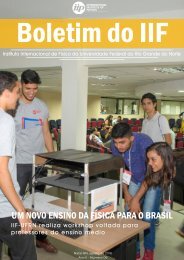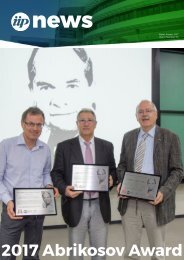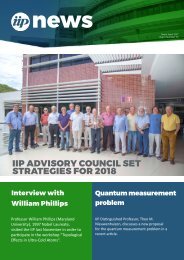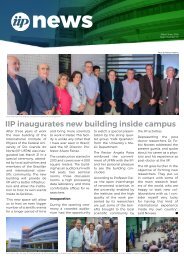IIP News 02
The IIP is a research institute with an international vocation, permanently facing the frontier areas of theoretical physics. Its mission is to intensify the exchange of scientific knowledge with the international community and, in particular with the Latin American community, being a pole unifying national strategic areas of theoretical physics.
The IIP is a research institute with an international vocation, permanently facing the frontier areas of theoretical physics. Its mission is to intensify the exchange of scientific knowledge with the international community and, in particular with the Latin American community, being a pole unifying national strategic areas of theoretical physics.
You also want an ePaper? Increase the reach of your titles
YUMPU automatically turns print PDFs into web optimized ePapers that Google loves.
news<br />
INTERNATIONAL<br />
INSTITUTE OF<br />
PHYSICS<br />
Natal,<br />
March, 2017<br />
Year II Number <strong>02</strong><br />
QUANTUM WORLD:<br />
NOW EVEN LESS<br />
LOCAL<br />
“What we found out<br />
was that quantum<br />
mechanics is even<br />
odder than what we<br />
thought”<br />
Professor Rafael Chaves<br />
Ref.: Science Advances 10 Aug 2016: Vol. 2, no. 8, e1600162<br />
In a recent paper, published in<br />
Science Advances, a team of<br />
researchers from the University<br />
of Queensland and the Heriot-Watt<br />
University, in collaboration<br />
with <strong>IIP</strong> Professor Rafael<br />
Chaves, performed an experiment<br />
that helped to prove that<br />
the tension between causality<br />
and quantum mechanics<br />
is even more surprising than<br />
what was imagined so far.<br />
Quantum mechanics allows<br />
the entanglement between<br />
two particles, a connection so<br />
strong that if we could entangle<br />
two light bulbs we would<br />
see them turn on and off in<br />
perfect synchrony, no matter<br />
how far they are from each<br />
other, and even without an obvious<br />
light switch.<br />
Einstein called this phenomenon<br />
spooky action at distance<br />
and as a result of his famous<br />
debate with Niels Bohr, proposed<br />
that it should be a light<br />
switch “hidden” somewhere,<br />
which would work as a common<br />
cause to the effect of<br />
turning the entangled lights<br />
on and off. This “hidden switch”<br />
would be a kind of hidden variable<br />
that was not described<br />
by quantum mechanics that<br />
therefore it would be an incomplete<br />
theory of nature.<br />
In the 1960´s physicist John<br />
Bell proposed an experiment<br />
to put an end to the debate<br />
and showed mathematically<br />
that quantum mechanics was<br />
incompatible with the theory<br />
dreamed by Einstein, a phenomenon<br />
known as “quantum<br />
non-locality”. The final<br />
proof of those results came<br />
in 2015 through a series of experiments<br />
made in the Netherlands,<br />
Austria and United<br />
States.<br />
Even odder results<br />
The paper published in Science<br />
Advances puts to the<br />
test a more complex version of<br />
Bell’s Theorem, testing a theory<br />
in which a light bulb could<br />
have a non-local causal effect<br />
on another one, propagating<br />
even faster than the speed of<br />
light. Surprisingly the correlations<br />
obtained in the experiment<br />
could not be explained,<br />
even allowing the “spooky”<br />
model of cause and effect.<br />
Professor Chaves (IIF-UFRN),<br />
responsible for the theoretical<br />
analysis in the publication,<br />
explains that the researchers<br />
created entangled twin photons<br />
to achieve these results.<br />
“What we found out was that<br />
quantum mechanics is even<br />
odder than what we thought.<br />
In the paper we derived new<br />
Bell Inequalities, which should<br />
be respected by the theories<br />
that allow the information to<br />
be transmitted instantaneously<br />
between two particles. However,<br />
the experimental results<br />
violated the limits imposed<br />
by those inequalities, showing<br />
that quantum entanglement<br />
is even stronger than was<br />
thought before”.
2<br />
<strong>IIP</strong> <strong>News</strong> - Year II, number <strong>02</strong><br />
The <strong>IIP</strong> has opened a call for a new post-doctoral<br />
program for professors in Brazil. This proposal<br />
offers a funding opportunity for physicists who<br />
already have a position in a public educational<br />
institution in Brazil and wish to strengthen their<br />
academic curriculum.<br />
In this first call the <strong>IIP</strong> is offering five research<br />
scholarships for 2017, with a monthly payment<br />
of R$ 4.100,00 (as a supplement to the professor’s<br />
salary) during a one year internship, renewable<br />
at the end of each year.<br />
During this period the participant must take a<br />
The meeting will be held<br />
at the <strong>IIP</strong> and will be presided<br />
by the IAC chairman,<br />
Professor Itamar<br />
Procaccia, member of<br />
the Weizmann Institute<br />
of Science (Israel), and<br />
Doctor Honoris Causa by<br />
the UFRN. The University<br />
Rector, Professor Ângeleave<br />
of absence from his/her institution and<br />
join one of the <strong>IIP</strong> research groups.<br />
Candidates who are not allowed to take a longer<br />
leave from their institutions can decide to<br />
take shorter internship periods with a minimum<br />
stay of 4 to 6 months at the <strong>IIP</strong>.<br />
Interested parties must send a copy of their<br />
research project, CV, list of publications and<br />
two recommendation letters. The applications<br />
will be analyzed continuously. All documents<br />
should be sent electronically to posdocbrasil@<br />
iip.ufrn.br.<br />
<strong>IIP</strong> hosts the 2017 annual<br />
IAC meeting<br />
Prof. David Nelson presents<br />
colloquium at the <strong>IIP</strong> in March<br />
The International Institute<br />
of Physics of the<br />
Federal University of Rio<br />
Grande do Norte (<strong>IIP</strong>-<br />
UFRN) is hosting from<br />
March 20 to 21 the annual<br />
meeting of its International<br />
Advisory Council<br />
(IAC).<br />
During these two days<br />
the academic directives<br />
and the program<br />
of events for 2018 will be<br />
defined. This is also the<br />
moment to evaluate the<br />
results achieved during<br />
the previous year and to<br />
discuss the development<br />
of new projects at the <strong>IIP</strong>.<br />
la Paiva, will also be<br />
present on the first day<br />
of the meeting to welcome<br />
the Members.<br />
Among the subjects<br />
that will be discussed<br />
during the meeting,<br />
the renowned scientists<br />
that form the IAC<br />
will evaluate the research<br />
activities at the<br />
<strong>IIP</strong> during the past year,<br />
select the projects to<br />
be part of the Institute’s<br />
2018 events program<br />
and approve prospective<br />
candidates for collaboration<br />
visits for the<br />
coming year.<br />
About the IAC<br />
The Council is constituted<br />
by scientists from<br />
Brazil and abroad with<br />
outstanding contributions<br />
to science in different<br />
areas of Physics, including<br />
two Nobel Prize<br />
Laureates.<br />
Professor David R. Nelson,<br />
a physicist from Harvard<br />
and IAC member,<br />
will present a colloquium<br />
at the <strong>IIP</strong> on March<br />
17, entitled “Gene Surfing<br />
and the Survival of the<br />
Luckiest”, when he will<br />
discuss physics views on<br />
the evolutionary history of<br />
the live species. This event will be open to the scientific<br />
community and will take place at the <strong>IIP</strong> auditorium at<br />
03:30 p.m.<br />
Professor Nelson will be visiting the <strong>IIP</strong> as part of the annual<br />
IAC (International Advisory Council) meeting, that<br />
will be held from March 20 to 21, will reunite leading scientists<br />
that form the IAC.<br />
Nelson’s research is in a range of theoretical problems,<br />
focusing on attempts to gain new insights into fluids,<br />
liquid crystals, polymers, phase transitions, glasses, superfluids,<br />
superconductors, and biophysics problems.<br />
The prediction of Halperin and Nelson of a fourth “hexatic”<br />
phase of matter, interposed between the usual solid<br />
and liquid phases, has now been confirmed in experiments<br />
on thin films and bulk liquid crystals.<br />
David Nelson is a recipient of the “Award for Initiatives<br />
in Research from the National Academy of Sciences”<br />
(1986); the “Guggenheim Fellowship” (1993-1994); the<br />
“Harvard Ledlie Prize of Harvard University” (1995) and<br />
the “Oliver E. Buckley Condensed Matter Prize” (2004).
March, 2017 3<br />
Interview with<br />
Prof. Rafael Chaves<br />
Graduated from the Federal University of Minas Gerais, and former researcher at CBPF, UFRJ (Brazil), ICFO (Spain) and<br />
the Universities of Freiburg and Cologne, Germany, Professor Rafael Chaves started his position as a full professor at<br />
<strong>IIP</strong> last July 2016. He will work on Quantum Information, Foundations of Quantum mechanics and Causal Inference.<br />
In this interview he talks about his plans for the future in <strong>IIP</strong>.<br />
<strong>IIP</strong> NEWS - Why did you choose<br />
to study Physics?<br />
PROF. RAFAEL CHAVES - I was<br />
very young, around 17 years<br />
old, and I liked computers and<br />
technology, this was my first<br />
choice, but then in my last year<br />
of high school I started reading<br />
a lot about science, in popular<br />
science books by Carl Sagan,<br />
Marcelo Gleiser and some other<br />
classic books in physics, also<br />
in biology and other areas.<br />
I started thinking that all of that<br />
was very interesting and maybe<br />
I could combine my interest<br />
in technology with science. So<br />
it was a natural choice.<br />
I had to choose something and<br />
somehow my latest interest<br />
was in science, so I thought:<br />
‘why not this career?’ I was very<br />
young and did not know if I<br />
would continue doing that. So I<br />
would say that it was very lucky<br />
that I chose the right field for<br />
me.<br />
<strong>IIP</strong> NEWS - When did you start<br />
getting interested in quantum<br />
information?<br />
PROF. RAFAEL CHAVES - My<br />
first contact with quantum information<br />
was in the second<br />
half of my studies, during my<br />
undergraduate, so this was<br />
back in 2003 if I am not mistaken.<br />
It was still a very young field<br />
back then. Basically no one in<br />
Brazil was working in this field,<br />
and a professor called Reinaldo<br />
Vianna was changing fields<br />
and decided to move to quantum<br />
information. He had two<br />
scholarships for people who<br />
wanted to learn about this new<br />
field with him.<br />
I liked the idea of studing this<br />
completely new field in Brazil.<br />
I had this scholarship for two<br />
years, quantum error correcting<br />
codes.<br />
This change was also something<br />
natural for me, because<br />
I always liked computers and<br />
technology, and instead of doing<br />
the ordinary high school, I<br />
went to a technical school in<br />
industrial informatics, where<br />
we basically learned to develop<br />
and fix hardware and softwares.<br />
Instead of doing computing<br />
classes I was now doing<br />
quantum computing classes.<br />
<strong>IIP</strong> NEWS - How did you decide<br />
to dedicate your career to<br />
research?<br />
PROF. RAFAEL CHAVES - This<br />
was when I realized that science<br />
could be really fun. Quantum<br />
information was a very<br />
young and interesting field. No<br />
one knew very much about it<br />
in Brazil. Further, it was a field<br />
with the promise of unifying<br />
technology and science towards<br />
something really important.<br />
So this was the point when<br />
I decided to continue doing<br />
physics and dedicate my career<br />
to research.<br />
<strong>IIP</strong> NEWS - How did you get to<br />
know the <strong>IIP</strong>?<br />
PROF. RAFAEL CHAVES - It<br />
was in 2013, I had never heard<br />
about the Institute before. It<br />
was through a collaborator, that<br />
at that time was working in<br />
Minas Gerais, Professor Marcelo<br />
Terra Cunha, invited me to an<br />
event at <strong>IIP</strong>’s old building.<br />
Before that, I had never been<br />
in Natal, so this was my first<br />
time here and I realized that if<br />
I would ever come back to Brazil,<br />
this city would be one of my<br />
first choices, for many reasons.<br />
First I liked the city itself, this<br />
was on a personal side, and<br />
from the academic point of<br />
view, the Institute seemed like<br />
a really rare case in Brazil, where<br />
you can focus on research. I like<br />
teaching, but to have this focus<br />
on research is something very<br />
important. I thought “If I come<br />
back to Brazil, this place has all<br />
I like”.<br />
Another thing that attracted<br />
me academically to apply for<br />
the position here was the fact<br />
Photo by Cyro Lucas Souza<br />
Professor Rafael Chaves<br />
that quantum information<br />
is growing a lot in Brazil, but<br />
there are still very few researchers<br />
working on the kind of research<br />
I’m involved. So, I liked<br />
the idea of starting something<br />
new here.<br />
<strong>IIP</strong> NEWS - What are your plans<br />
of research for the future?<br />
PROF. RAFAEL CHAVES - I<br />
think that the <strong>IIP</strong> has a bright<br />
future. For me it’s a very nice<br />
opportunity to bring quantum<br />
information here as my own<br />
subfield, and help develop this<br />
area of research in the northeast<br />
of the country.<br />
To this goal the <strong>IIP</strong> will be very<br />
important, since I will be able<br />
to teach students about it, from<br />
the very basic to the frontier<br />
topics.<br />
We are also organizing seminars<br />
and scientific international<br />
events, so I will be able to bring<br />
the best researchers in quantum<br />
information to exchange<br />
their experience with local scientists.<br />
I would also like to talk about<br />
science to non-experts, give<br />
open lectures to high school<br />
students, or from their earlier<br />
years at the University, to talk<br />
about physics with them. Also<br />
to develop my research here<br />
and collaborate in new fields.
4<br />
New <strong>IIP</strong> researchers<br />
<strong>IIP</strong> <strong>News</strong> - Year II, number <strong>02</strong><br />
A new group of post-doctoral researchers is arriving at the <strong>IIP</strong> in 2017 to work in one of its six areas<br />
of research. Some of those physicists are already in Natal, conducting research jointly with <strong>IIP</strong><br />
professors and external collaborators.<br />
SAMURAÍ BRITO<br />
Born in Rio de Janeiro, but already living in Natal<br />
for many years, Samurai Brito finished her master’s<br />
and doctorate degree at the UFRN focusing<br />
on statistical and computational physics.<br />
Now as a member of the <strong>IIP</strong>, Dr. Brito is working<br />
in the field of Quantum information under the<br />
supervision of <strong>IIP</strong>’s Professor Rafael Chaves.<br />
“This certainly is a new challenge in my career.<br />
I am working a lot in this new project. For now I<br />
am reviewing some famous experiments to get<br />
to know better this field (quantum information), but I hope to make new contributions soon”.<br />
ANDREA PRUDENZIATI<br />
Andrea Prudenziati was born in Milan (Italy) and concluded his doctorate at SISSA, Trieste, where<br />
he started his work in the field of String Theory. Later, Dr Prudenziati moved to Japan, to work<br />
at the University of Kyoto. “What attracted me to the<br />
researcher career was the opportunity to work in<br />
different places around the world and the flexibility<br />
that I would have to develop my work in my own time”,<br />
says Prudenziati.<br />
After some time in Japan he had the opportunity to<br />
come to Brazil and joined the University of São Paulo<br />
(USP), where he worked on String Theory and ADS/<br />
CFT Correspondence. “I wanted to visit other centers<br />
in Brazil when I heard about the <strong>IIP</strong> in Natal. At the<br />
time I did not know about the post-doc position here,<br />
but when I got the opportunity I came”. At the <strong>IIP</strong> Dr.<br />
Prudenziati is also working on holographic description<br />
of entanglement and is collaborating with Professors<br />
Dmitry Melnikov and Rafael Chaves.<br />
Post-Doctoral Positions in Quantum Information<br />
The starting date for the positions can<br />
be negotiated but is expected to be in<br />
the period between May 2017 and November<br />
2017. The post-doctoral appointments<br />
will be for two years (extendible<br />
to two more years depending on mutual<br />
agreement) with a tax free monthly<br />
salary of R$ 7.000,00 (seven thousand<br />
Brazilian Reais).<br />
Interested candidates should send their<br />
CV with a list of publications,a short research<br />
statement and at least two letters<br />
of reference (in English) to Prof. Rafael<br />
Chaves (rchaves@iip.ufrn.br).<br />
The <strong>IIP</strong>-UFRN is located in the city of<br />
Natal in the Northeast of Brazil. It is a<br />
research institute of an international<br />
character, focused on the theoretical<br />
research in the modern areas of fundamental<br />
physics.<br />
Aiming at a leading role in the region,<br />
the Institute supports vast exchange,<br />
visitor and conference programs. It is<br />
also connected to the graduate program<br />
in physics of the UFRN, where<br />
it assists in providing excellence in<br />
post-graduate education in Brazil.
Next Schools & Workshops<br />
March, 2017 5<br />
Conferences to Come<br />
Workshop Topological States of Matter<br />
March 21 to April 12, 2017<br />
Workshop Collective Spin Transport in Electrical<br />
Insulators<br />
April 24 to May 26, 2017<br />
16th International Workshop on Vortex Matter<br />
May 28 to June 03, 2017<br />
Workshop Physics and Biology of Protein<br />
June 12 to June 30, 2017<br />
Workshop Quantum Devices<br />
July 03 to August 24, 2017<br />
Workshop Black Holes Across the Scales<br />
July 31 to August 18, 2017<br />
IX Brazilian Meeting on Simulational Physics<br />
(BMSP)<br />
August 21 to 25, 2017<br />
Workshop Out of Equilibrium Dynamics in Soft<br />
and Condensed Matter<br />
August 28 to September 10, 2017<br />
Seminars and Colloquia<br />
March 07, 2017<br />
Seminar On The Notion of Singular Space-Time in General Relativity and Beyond<br />
with Prof. Gonzalo J. Olmo;<br />
March 17, 2017<br />
Colloquium Gene Surfing and Survival of the Luckiest<br />
with Prof. David R. Nelson;<br />
March 31, 2017<br />
Seminar Quantum Certification of Many-Body Quantum Simulations<br />
with Prof. Leandro Aolita.<br />
Contact us at press@iip.ufrn.br to receive news about our seminars and colloquia in your email.
6<br />
<strong>IIP</strong> <strong>News</strong> - Year II, number <strong>02</strong><br />
<strong>IIP</strong> Photo Galery<br />
<strong>IIP</strong> Events in 2016<br />
Workshop Interference of Magnetism and Superconductivity<br />
Colloquium with Sir Michael Berry<br />
CIENTEC 2016<br />
Workshop Quantum Non-Equlibrium Phenomena<br />
Brazilian Physics Day<br />
Brazilian Physics Day<br />
Workshop Strings at Dunes<br />
International School on Laser-Beam Interactions (Brazil, France, Italy)<br />
INTERNATIONAL<br />
INSTITUTE OF<br />
PHYSICS<br />
Visit our website to know more about our programs and events:<br />
www.iip.ufrn<br />
To see the guidelines for scientific proposals at the <strong>IIP</strong> visit:<br />
www.iip.ufrn.br/proposalsforeventsdetail<br />
Follow the <strong>IIP</strong> activities in our Facebook page:<br />
www.facebook.com/iipufrn<br />
Subscribe to our Youtube chanel:<br />
www.youtube.com/iiptv<br />
<strong>News</strong>letter produced by the <strong>IIP</strong> Communication Office.<br />
Contact us at:<br />
+55 (84) 3342-2249 (ext. 208) / press@iip.ufrn.br.







